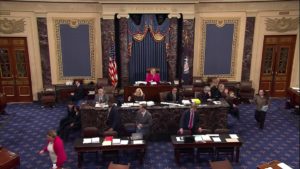Churches and non-profit organizations are calling for the repeal of a provision in the GOP’s tax cuts law that would force ministries to file federal tax returns, and in some cases pay taxes.
Hong Kong churches threatened over Tiananmen commemorations
Last winter, as lawmakers touted the tax savings in the Tax Cuts and Jobs Acts, no one mentioned a new federal tax on local churches. But for non-profits like Christian ministries, that little-known provision in the legislation has become a big cause for concern.
Today, senators on both sides of the aisle appealed to the Department of Treasury and IRS to delay implementing the law until a myriad of questions surrounding it can be answered and non-profits can better prepare.
“Requiring these organizations to pay a federal tax on these employee benefits, something they have never been required to do before, will cause them to not only face an increased operating cost, but also an administrative burden by filing 990-T forms with the IRS for the first time,” reads a letter signed by Sens. James Lankford (R-OK) and Chris Coons (D-DE), who co-chair both the National Prayer Breakfast and the Senate Prayer Breakfast.

Under the new law, churches, hospitals, colleges and other historically tax-exempt groups must pay a 21 percent tax on some benefits they provide their employees, such as parking, transportation and other related benefits.
Dan Busby is president of the Evangelical Council for Financial Accountability (ECFA). He says churches weren’t expecting to get hit with—of all things—an income tax bill, and this one could be a huge burden on groups that have historically enjoyed tax-exempt status.
“There are nearly 15 million employees that work in the United States for non-profits—nearly 10 percent of the workforce—so that’s 15 million parking places. And conservatively, it’s going to cost the non-profit community as a whole up to a billion dollars,” Busby tells CBN News.
That’s a lot of money for ministries that rely on donations. In response to the news, the ECFA put out a petition that churches and nonprofits can sign to protest the employee parking tax.

